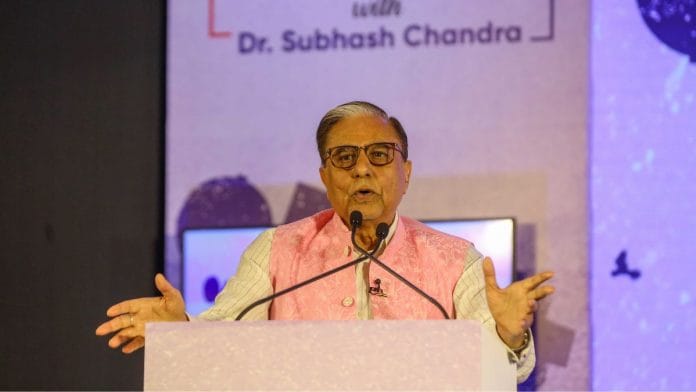New Delhi: Zee News’ “editorial decision” to not publish an interview with Delhi Chief Minister Arvind Kejriwal in its entirety led to a “forced” blackout of its channels in Punjab last week, which caused Zee Entertainment’s Chairman Emeritus and media baron Subhash Chandra to speak out.
At a press conference in Delhi, he said that the fourth pillar of democracy was under threat, and that India’s 159th rank in the World Press Freedom Index was cause for concern.
“Zee News must publish the entire interview, else it will face consequences like the withdrawal of advertising by the Punjab Government at least,” an Aam Aadmi Party spokesperson had told the news channel, referring to an interaction between Kejriwal and a senior journalist at Zee on 23 May.
This further spiralled into a complete blockade, which consisted not just of Zee News in Punjab, but also Zee Delhi NCR, and their entertainment channels. AAP spokespeople stopped participating in TV debates conducted on Zee.
After an eight-day legal battle, their channels were back on air, Chandra said. According to him, the political party had leveraged the monopoly of a certain Multiple System Operator (MSO) in Punjab.
Chandra said that while he didn’t watch the interview himself, he was told by his editor that Kejriwal had made “objectionable comments”, which were personal in nature, and that the video “cannot and should not be aired”. He also confirmed that his response –– legal recourse and a call for solidarity from the fraternity –– would have been the same, even if the pressure would have come from the central government.
According to Chandra, this was not an isolated incident, but part of a larger “illness” that has gripped the industry. “In monthly review meetings, my business colleagues say: my revenue fell because the editorial section carried negative statements about state governments,” he said.
India’s ranking in the Press Freedom Index has never been particularly high, usually meandering between 100 and 150. Chandra attributed the “diminishing freedom” to a group he categorised as the “governing class”.
“We have never been below a hundred. It is because of the governing class, which isn’t necessarily the central government. It can also be a business house, the state government, or a moneyed person,” he said.
The self-confessed media pioneer and former Rajya Sabha MP went on, “Indira Gandhi’s defeat after the Emergency clearly showed the importance of the press. The same people committing atrocities were also censoring people. She never found out what was happening on the ground. They’re making a mistake by not giving the press freedom.”
Also Read: Before returning to jail, Kejriwal says ‘exit polls fake’, urges INDIA bloc to stay alert on 4 June
‘News outlets accepting pressure’
However, at the press conference, Chandra also held the industry responsible for its predicament.
“Unfortunately, many of the news channels, newspapers, social media and digital platforms have started accepting the pressure as part of life, instead of resisting or voicing disagreement,” he said.
On 3 May, World Press Freedom Day, Chandra had shared a video message. “It is unfortunate that India’s ranking is 159 out of 180 countries. I am known as the founder and pioneer of private news television in India. Today, there are over 500 such channels in India, with lakhs of people employed,” he had said.
In the video, Chandra had narrated an incident. 33 years ago, when he was trying to set up Zee, he was told by a bureaucrat: “Over my dead body Subhash Chandra, I will not let you do this. And if you try, I will put you in jail.” He was shocked, and had left the meeting by telling him that he’d “do whatever he has to do”.
Recalling the incident, Chandra had said, “Today, I feel something similar.”
Though, his politics have remained consistent throughout.
“As far as personal issues are concerned, nothing has changed. I have been an RSS Swayamsevak, and they taught me the nation-first philosophy, which I practice. The BJP, as a political outfit, has a similar philosophy,” Chandra said at the press conference. “We [Zee] were the first to recognise in 2012-2013 that people were unhappy with the regime.”
The claims don’t seem to bother him. “I don’t think ill of the people who call me ‘Godi Media’. They’re doing their dharma, and I’m doing mine,” he said.
‘Godi Media’ is a disparaging term often used to represent a section of news outlets, who are seen as government mouthpieces.
(Edited by Mannat Chugh)
Also Read: Youth voted more for INDIA bloc than older people, farmers preferred NDA — Axis My India exit poll






